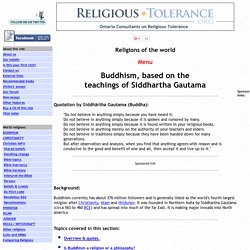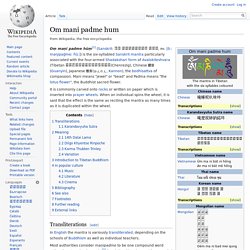

The religion of Buddhism. Religions of the world Menu Quotation by Siddhãrtha Gautama (Buddha): "Do not believe in anything simply because you have heard it.

Do not believe in anything simply because it is spoken and rumored by many. Do not believe in anything simply because it is found written in your religious books. Sponsored link Background: Buddhism currently has about 376 million followers and is generally listed as the world's fourth largest religion after Christianity, Islam and Hinduism. Topics covered in this section: Sponsored link: Amazon.com's online store lists the following books on Buddhism: If you see a generic Amazon.com ad here, please click on your browser's refresh key. For an introduction to Buddhism, we recommend the following books. Thubten Chodron, "Buddhism for Beginners.
" Not a sponsored link Site navigation: Copyright © 1996 to 2011 by Ontario Consultants on Religious Tolerance Latest update: 2013-JUL-08 Author: B.A. Sponsored link. WheelofLife.jpg (JPEG-bild, 1115x1593 pixlar) Avalokitesvara Bodhisattva Images & Pictures Gallery. Om mani padme hum. Oṃ maṇi padme hūṃ[1] (Sanskrit: ओं मणिपद्मे हूं, IPA: [õːː məɳipəd̪meː ɦũː]) is the six-syllabled Sanskrit mantra particularly associated with the four-armed Shadakshari form of Avalokiteshvara (Tibetan སྤྱན་རས་གཟིགས་(Chenrezig), Chinese 觀音(Guanyin), Japanese 観音(かんのん, Kannon), the bodhisattva of compassion.

Mani means "jewel" or "bead" and Padma means "the lotus flower", the Buddhist sacred flower. It is commonly carved onto rocks or written on paper which is inserted into prayer wheels. When an individual spins the wheel, it is said that the effect is the same as reciting the mantra as many times as it is duplicated within the wheel. Transliterations[edit] In English the mantra is variously transliterated, depending on the schools of Buddhism as well as individual teachers. Karandavyuha Sutra[edit] Meaning[edit] Mantras may be interpreted by practitioners in many ways, or even as mere sequences of sound whose effects lie beyond strict meaning. 14th Dalai Lama[edit] Karma Thubten Trinley[edit]
The Tibetan Book of the Dead - Donald S Lopez - Bok (9780691134352) "The Tibetan Book of the Dead" is the most famous Buddhist text in the West, having sold more than a million copies since it was first published in English in 1927.

Carl Jung wrote a commentary on it, Timothy Leary redesigned it as a guidebook for an acid trip, and the Beatles quoted Leary's version in their song "Tomorrow Never Knows". More recently, the book has been adopted by the hospice movement, enshrined by "Penguin Classics", and made into an audiobook read by Richard Gere. Yet, as acclaimed writer and scholar of Buddhism Donald Lopez writes, '"The Tibetan Book of the Dead" is not really Tibetan, it is not really a book, and it is not really about death'. In this compelling introduction and short history, Lopez tells the strange story of how a relatively obscure and malleable collection of Buddhist texts of uncertain origin came to be so revered - and so misunderstood - in the West. (Bookdata) + Visa hela texten - Visa kortare text Kundrecensioner Recensioner i media Donald S. DHARMA.